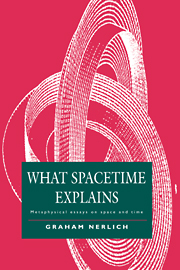Book contents
- Frontmatter
- Contents
- Preface
- Introduction
- Part One Ontology and methodology in relativity
- 1 On Learning from the mistakes of Positivists
- 2 What ontology can be about with Andrew Westwell-Roper
- 3 Special Relativity is not based on causality
- 4 Simultaneity and convention in Special Relativity
- 5 Motion and change of distance
- Part Two Variable curvature and General Relativity
- Part Three Time and causation
- Bibliography
- Index
1 - On Learning from the mistakes of Positivists
Published online by Cambridge University Press: 19 October 2009
- Frontmatter
- Contents
- Preface
- Introduction
- Part One Ontology and methodology in relativity
- 1 On Learning from the mistakes of Positivists
- 2 What ontology can be about with Andrew Westwell-Roper
- 3 Special Relativity is not based on causality
- 4 Simultaneity and convention in Special Relativity
- 5 Motion and change of distance
- Part Two Variable curvature and General Relativity
- Part Three Time and causation
- Bibliography
- Index
Summary
Aims of the paper
Philosophers have much extended our understanding of the foundations of spacetime physics in this century. They go on doing so. Much of this is the work of positivists and conventionalists. Friedman (1983, Introduction) tells us in his excellent book that we must learn from their mistakes if we hope to go beyond them. I will look at two of their mistakes: one is about simultaneity and the other is about the relativity of motion.
In my view, the most interesting and suggestive arguments take the old-fashioned form that the world could not possibly be as our best scientific theories say it is. One argues that physics, as the scientists hand it down to us, is conceptually awry and must be rewritten, either by amputating parts of it or by interpreting these parts as conventions, not factual claims. They are metaphysical arguments. In this century, Mach, Einstein, Reichenbach and Grünbaum have urged them. Epistemology appears in them only by ruling out concepts from a fact-stating role unless they meet some observational criterion or other.
It would be absurd to claim that this exhausts the normative role of epistemology in the philosophy of science. But I see little value in asking, about these dismembered forms of physical theory, whether they are better evidenced than the standard forms used by the practising physicist. We philosophers are not likely to choose better than they do, even if we enlarge their view of what they may choose among. Further, a main theme will be that a focus on the observationality of ideas and on parsimony of theoretical structure misled us for decades as to what spacetime theories were about.
- Type
- Chapter
- Information
- What Spacetime ExplainsMetaphysical Essays on Space and Time, pp. 17 - 36Publisher: Cambridge University PressPrint publication year: 1994



